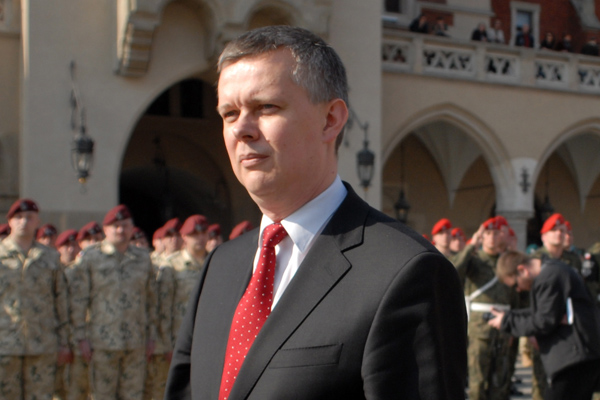BY MARCIN GOETTIG AND MARCIN GOCLOWSKI


Tomasz Siemoniak, Poland's defence minister
Russia's military intervention in Ukraine's Crimea peninsula makes it vital that NATO station significant numbers of troops in eastern Europe and ignore any objections Russia might have in this respect, Poland's defence minister said.
Tomasz Siemoniak, in an interview with Reuters, said western Europe was safe thanks to the U.S. military presence there, adding that Russia's military was ready to intervene in Poland's neighbour, Ukraine.
Russia's annexation of Crimea has caused the deepest crisis in East-West relations since the Cold War and raised fears in the region's NATO members, including Poland, about their own security.
"Threats are still present in Europe," Siemoniak said. "We believe that NATO should not be limited in anything which concerns the security of its members."
NATO presented satellite photographs last week it said showed Russian deployments of 40,000 troops near the Ukrainian frontier ready for action.
"If troops are on the border and Russia's law allows, contrary to international law, a possible intervention, then one has to fear that such an intervention may take place," Siemoniak said.
NATO has suggested it is more likely to beef up eastern European security through rotating reinforcements rather than permanently basing substantial additional combat forces there.
Poland, whose army is dwarfed by nuclear-armed Moscow, is calling for the permanent presence of NATO forces in Poland.
Such calls are opposed by Russia, which says deployment of significant NATO forces in eastern European countries close to Russia would violate the 1997 Founding Act, a cooperation agreement between Moscow and the alliance.
But Siemoniak said the agreement was no longer binding after Russia violated international law by grabbing part of Ukraine's territory.
"To be effective, NATO needs to have the capacity. It needs to have it also in eastern Europe," he added. "Hence, one should not treat this limitation as binding."
Siemoniak is travelling this week to the United States to discuss deepening military co-operation with Defence Secretary Chuck Hagel. A potential NATO base in Poland will be one of the topics, Siemoniak said.
The Polish minister said such a base was present in U.S. planning, with NATO's decision on the issue likely to be taken at the alliance's summit in September.
"What is really important is the strengthening of NATO's eastern flank," Siemoniak said.
Last month, responding to a request from Warsaw, the United States decided to increase the scale of its military exercises in Poland, sending 12 F-16 fighter jets to the country.
Previously, there was only a small detachment of U.S. army personnel on the ground in Poland. The United States also has plans to deploy elements of its missile shield in Poland by 2018.
EUROPE'S SECURITY
Since toppling Soviet-imposed communism in 1989, Warsaw has sought to deepen its strategic military alliance with the United States, which is seen as the ultimate guarantor of its security.
"Europe is safe, because the U.S. is present here," Siemoniak said. "Only the U.S. has sufficient military power to stand up to any country that breaks international law and took a part of the territory of another country."
Poland has lived through more than forty years of Soviet domination after World War Two and sees it as one of the greatest catastrophes in the nation's history.
Poland had security guarantees from a number of European powers ahead of World War Two, including France and Britain, but they did not prevent the country from falling into Moscow's grip after 1945.
"It is in the interest of the United States that their allies are safe," Siemoniak added, responding to U.S. critics of America's potential increased military presence abroad.
"It is important that the U.S. feels that if it resigns from its global role, then the world, and thus the U.S. itself, will be less secure. This is what we think in Poland," he said.
Poland, now the largest economy in central and eastern Europe, joined NATO 15 years ago and the European Union 10 years ago to place itself firmly within the West's sphere of influence. Warsaw has also helped the United States in its war in Iraq and also sent troops to Afghanistan.
Siemoniak said that this year Poland will celebrate the 25th anniversary of regaining its independence.
"These 25 years of Poland and the region should be a very strong signal for the West how profitable it is to help and invest, so that the sphere of freedom, democracy and free markets grows larger."

No comments:
Post a Comment